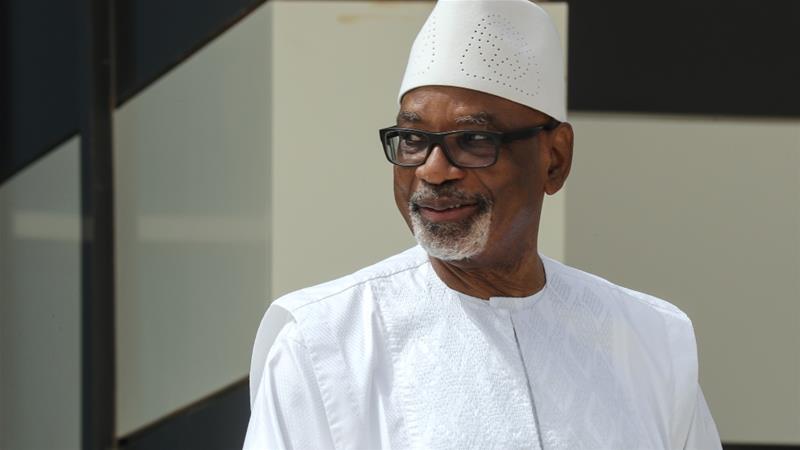
Opposition supporters gathered at Independence Square in Bamako to express support for the actions of the soldier
Some senior government ministers and army officers were also reportedly under arrest but it was not clear by whom.
It was also not immediately clear who was behind the unrest or where embattled President Ibrahim Boubacar Keita - who has faced weeks of opposition protests calling for his departure - was when it erupted. Reports said he had been taken to a safe location.

Opposition supporters react to the news of a possible mutiny of soldiers in the military base in Kati. The sign reads: 'Down with France and its governor'
Speaking from Bamako, journalist Mohamed Salah told Al Jazeera that the situation in Kati was "very confusing", with reports of soldiers putting up barricades in the town and detaining officials.
There were also reports of protesters gathering at an independence monument in Bamako calling for Keita's departure and expressing support for the actions of the soldiers in Kati.
Earlier, the Norwegian Embassy in Mali said in an alert to its citizens: "The embassy has been notified of a mutiny in the Armed Forces and troops are on their way to Bamako. Norwegians should exercise caution and preferably stay at home until the situation is clear."
Similarly, the French Embassy said: "Because of serious unrest this morning, August 18, in the city of Bamako, it is immediately recommended to remain at home."
Mali has been mired in a deep political impasse for months as Keita came under fierce pressure from the opposition June 5 Movement to resign.
"The country has seen several protests since June after parliamentary elections were declared by the opposition as rigged," said Al Jazeera's Ahmed Idris, reporting from Abuja in Nigeria.
"What we know right now is that there have been several arrests [on Tuesday] including military officers and [government] ministers," he added.
Political crisis
Keita's opponents have led mass protests for more than two months, demanding his resignation amid growing dissatisfaction over Mali's economic woes, perceived high-level corruption and the failure to contain a worsening security situation that has rendered vast swathes of the country ungovernable.
At least 14 protesters were killed during three days of clashes with security forces last month, according to the United Nations and human rights activists.
Regional powers are worried that any prolonged unrest from the protests could derail the battle against armed fighters in the wider Sahel region, many of whom are centred in Mali.
On March 21, 2012 a mutiny erupted at the Kati military camp as rank-and-file soldiers began rioting and then broke into the camp's armoury. After grabbing weapons they headed for the seat of government, led by then Captain Amadou Haya Sanogo.
The turmoil contributed to the fall of northern Mali to fighters and Sanogo was later forced to hand over power to a civilian transitional government that then organised an election.
The 2013 vote was won by Keita, who got re-elected five years later.
Regional mediators have urged the 75-year-old president to share power in a unity government but those overtures were swiftly rejected by opposition leaders who said they would not stop short of Keita's departure.
 Opposition supporters gathered at Independence Square in Bamako to express support for the actions of the soldier
Opposition supporters gathered at Independence Square in Bamako to express support for the actions of the soldier




Comments
Post a Comment